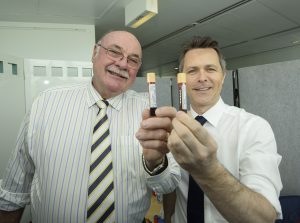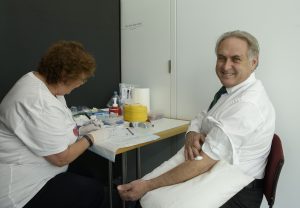The post Fabry disease: the genetic condition you’ve probably never heard of first appeared on Know Pathology Know Healthcare.
]]>April marks Fabry Awareness Month so we caught up with Megan Fookes, Managing Director of Fabry Australia, to find out more about the condition, the treatment available and how people living with Fabry disease rely on pathology.
What is Fabry disease?
Fabry disease is a hereditary genetic condition. A genetic mutation on a person’s X chromosome means they don’t produce enough alpha-galactosidase A (Alpha A). Alpha A is an enzyme essential for breaking down waste products in the body. A deficiency in the enzyme will, over time, lead to a build up of waste in the body’s cells which in turn leads to cell damage.
The symptoms of FD can vary a lot between cases, but they include pain in the hands and feet, sometimes spreading to other parts of the body, headaches and fatigue, gastrointestinal issues, hypohidrosis (lack of sweating), hearing impairment, clouded eyes, and skin lesions known as angiokeratomas. Over time, patients typically develop more serious symptoms that affect the kidneys, heart and brain.
How is Fabry disease diagnosed?
A blood test can measure the amount of Alpha A in the blood. People with Fabry disease will have low levels of, or even no, Alpha A in their blood.
Genetic testing can also be useful for diagnosing women, who may have normal levels of Alpha A in their blood. It was previously thought that women could be carriers but not develop symptoms of FD, but more recent research has shown that woman can have symptoms just like men.
Fabry Australia estimate that for every initial diagnosis of Fabry disease up to five other family members could be subsequently diagnosed.
It is likely that given the huge range of symptoms and potential for misdiagnosis, the number of people living with FD in Australia is higher than those currently diagnosed.
In Japan, for example, all babies are screened for FD at birth, and since this testing was introduced the number of people diagnosed in Japan has increased significantly. This is good news for patients – the earlier someone is diagnosed the better managed their condition is likely to be and the less likely they are to experience complications.
What treatment is available?
There is no cure for Fabry disease, but the condition can be managed. A person whose Fabry disease is not too severe will probably have an annual check up involving blood and urine tests to monitor kidney health as well as other tests to monitor their heart and brain.
For patients whose disease has progressed, the most widely used treatment is Enzyme Replacement Therapy. The missing enzyme, Alpha A, is administered to the patient once every two weeks via an IV. Studies have shown that ERT can greatly reduce pain, stabilize or improve renal function and cardiac abnormalities, and improve quality of life.
There is a second treatment option currently being researched in clinical trials. It is an oral therapy, but it is only effective for people with certain mutations of Fabry Disease. It won’t work for a person who has no Alpha A present. Testing therefore plays an important role in confirming who will benefit from treatment.
Fabry Australia is a Patient Association made up of members and families diagnosed with Fabry disease. They work to raise awareness about Fabry disease and are involved in research projects, fundraising, patient advocacy and support.
Megan’s parents were co-founders of Fabry Australia, after her father David Davie was diagnosed with the condition at the age of 48.
“One of the problems of suffering a rare disease such as Fabry is that any individual doctor is likely to have limited experience in treating the condition. As well as research and advocacy the specialized Fabry Clinics are a priority for us, so that people with the condition can access the best treatment possible.”
Find out more about Fabry Australia on their website.
*Pictured: Kidney biopsy from a patient with Fabry disease.
The post Fabry disease: the genetic condition you’ve probably never heard of first appeared on Know Pathology Know Healthcare.
]]>The post Politicians receive prostate cancer blood tests in Parliament House first appeared on Know Pathology Know Healthcare.
]]>


In total 91 men participated in testing including Minister for the Environment and Energy, the Hon Josh Frydenburg MP, Minister for Aged Care and Indigenous Health, the Hon Ken Wyatt AM as well as MP and Shadow Treasurer, the Hon Chris Bowen.
The event was a fantastic opportunity to show parliamentarians first-hand the utility of PSA testing and the benefits of appropriate pathology testing more broadly.
Prostate cancer is the most common cancer in Australian men with 20,000 men diagnosed with the disease each year. In 2017, it is estimated that 3,452 Australian men will die from prostate cancer.
PCFA encourages men between the ages of 50 and 69 to discuss PSA testing with their GP as part of their regular health check-up. For men who decide to undergo testing, the general recommendation is to have a PSA blood test every 2 years, from age 50 to age 69. Men whose risk of prostate cancer is higher than average due to family history can begin testing in their forties, depending on their level of risk.
Associate Professor Anthony Lowe, Chief Executive Officer of PCFA spoke at the event.
“We want men to feel empowered to take control of their own health, learn about their family history and pro-actively ask their GP about their testing options. A check-up is a good opportunity for men to discuss the benefits and harms of testing with their GP before making an informed decision.”
For co-Chairs Hon Jason Clare MP aged 45 and the Hon Warren Entsch MP aged 67 – who are at opposite ends of the age bracket – PSA testing is especially important. Jason Clare MP who lost his grandfather to prostate cancer, commented:
“Unfortunately, a lot of men don’t get checked until it’s too late when all it takes is a simple blood test. Talk to your doctor and get tested. It might just save your life”.
Hon Warren Entsch MP said:
“Prostate cancer is a disease I have become very familiar with in recent times having lost two friends this way. It wasn’t really something I thought about before then but now I know it’s absolutely critical especially as I mature. Take it from me it’s better to be educated by your doctor or PCFA, rather than finding out about prostate cancer like I did through the deaths of close friends.”
The post Politicians receive prostate cancer blood tests in Parliament House first appeared on Know Pathology Know Healthcare.
]]>